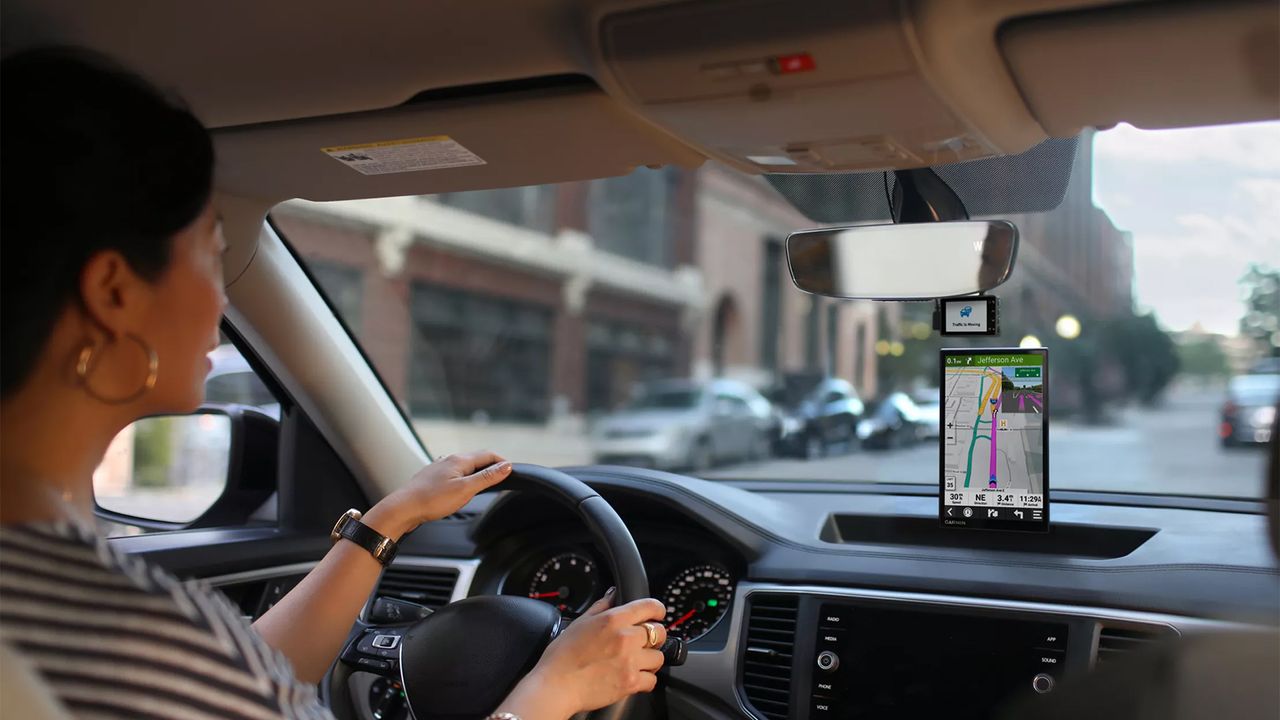

You could argue that you don't really need one of the best sat navs any more. After all, if your car hasn't got an infotainment system of its own, we basically all own a smartphone and that's good enough for navigating, listening to tunes and checking notifications, right?
Maybe, but using your smartphone for car navigation means you often need to carry a charging cable to use Apple CarPlay or Android Auto, and if you go wireless - or use your phone's display on a windscreen mount - it'll kill the battery before you can say, "take the third exit on the roundabout".
Another reason to opt for a proper sat nav rather than relying on your phone is the sheer breadth of features. For a start, the maps are often stored on the device itself, so you'll never get lost when your phone loses signal or runs out of data. Some models also include free safety camera alerts, live traffic information, voice controls, and a built-in dash cam with safety features like lane departure and forward collision warnings.
So buckle up, tap in the postcode, and join T3 on a journey through the best sat navs on sale today. And, if you're looking to complete your in-car dash upgrade, maybe you could look at the best dash cam. If you've decided that a sat nav isn't for you and Google Maps is good enough, you could also check out the best car phone holders.
The best sat navs to buy today
Why you can trust T3
Car sat navs
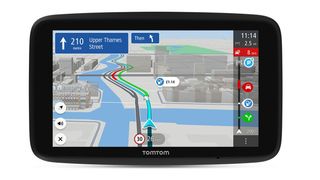

1. TomTom Go Discover
Specifications
Reasons to buy
Reasons to avoid
The TomTom Go Discover is a straightforward navigation device without fancy features. It is ultimately about utility, not showbiz moves and fancy tricks, and there's no doubt TomTom delivers excellent usability here. That starts with clear and legible maps and possibly the best lane guidance in the business. Perhaps best of all, it's very quick and easy to use. This device is a little on the expensive side, especially if you consider the cost of a Live subscription after your one-year trial. But, if it's pure navigation without the frills you're after, you can't go wrong with this TomTom.
Read our full TomTom GO Discover review
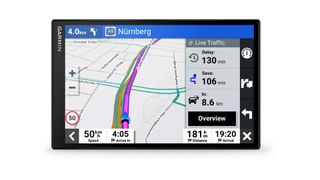
2. Garmin DriveSmart 86
Specifications
Reasons to buy
Reasons to avoid
Garmin has thrown the kitchen sink at this device, with pretty much every connected feature going beamed to a massive 8-inch high-resolution display - one that can be mounted in both portrait or landscape mode.
Because this sits at the very top of Garmin’s current sat nav line-up, it packs the brand's built-in voice assistant, which responds to voice prompts and allows drivers to navigate to locations without the need to prod the screen.
However, don’t expect this to be able to compete with some of the natural language models currently employed by some of the world’s biggest automakers, particularly those that have started integrated ChatGPT and the like - nor is it upon there with Siri and other favoured voice assistants.
That said, it does play nicely with Amazon Alexa, so you can ask the device to play music, listen to audiobooks, hear the news and more.
Bluetooth and Wi-Fi technology allows for seamless synching with most smartphones (both Android and iOS), meaning those in the car can make hands-free calls, as well as make the most of live traffic information, fuel prices and certain notifications that might pop up on a paired smartphone.
What’s more, Garmin aims to make you a safer driver by warning of upcoming sharp curves, changes in the speed limit and safety camera positions. There is the worry it turns into a beeping backseat driver, but all of these options can easily be customised in the system menu.
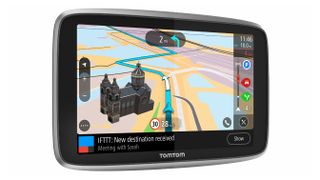

3. TomTom Go Premium
Specifications
Reasons to buy
Reasons to avoid
The TomTom GO Premium is the most feature-packed, best-connected, and smartest navigation device on the market, packing a number of features which help it compete with your smartphone. The state-of-the-art sat nav is designed to assist you throughout your journey, from before you get in the car through to the last few steps to your destination.
Built-in Wi-Fi will ensure that the software and maps are always up-to-date, while you can use the TomTom MyDrive companion app to pre-plan your route, sending a destination to the device. During the drive, the TomTom GO Premium can share location and arrival time with contacts (if you have an Android phone), and once the destination has been reached, the sat nav hands over to the TomTom MyDrive app to direct you on foot to the true final destination.
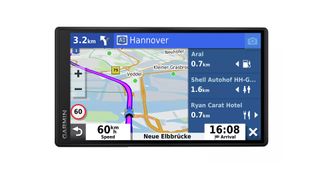
4. Garmin Drive 55
Specifications
Reasons to buy
Reasons to avoid
One of Garmin’s most recent offerings cleverly piggy-backs off a smartphone to provide live traffic information, as well as niceties like Tripadvisor traveller ratings for stop-off points along the route.
This Drive 55 model features a sharp 5.5-inch touchscreen that is bright and a lot easier to read than a diminutive smartphone sucker-mounted to a window. It also comes preinstalled with European-wide maps, so can easily be used when phone data becomes an issue, while routing is fast and easy to follow.
Granted, you can do most of this stuff if you’ve got a head unit that’s compatible with Android Auto or Apple CarPlay, but the Garmin unit works even without mobile signal and then offers all of the smartphone extras, such as live traffic info and weather warnings, when you do.
Garmin has also improved its spoken navigational prompts in recent years, with the advent of Real Directions using street names, shop names and recognisable landmarks to guide you like a human co-pilot would.
Plus, preloaded Foursquare acts like Google, making it easier to find shops, restaurants, fuel stations and much more when searching by name. This feature also carries over into live navigation situations, showing a list of food stops, fuels stations and more that are up ahead on the route.
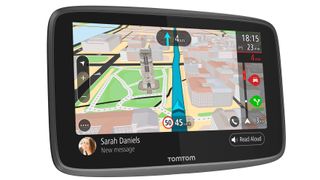
5. TomTom GO 6200
Specifications
Reasons to buy
Reasons to avoid
The TomTom GO 6200 deserves its place high up on this list, thanks to its legendary route guidance, ease of use and Lifetime everything — from map updates for dozens of countries to safety camera and traffic alerts — all delivered using the built-in Lifetime SIM.
Other goodies include built-in Bluetooth so you can pair it with your smartphone, as well as Google Now and Siri integration. And the TomTom GO 6200 includes Wi-Fi connectivity, so you can get map updates via your home network without having to hook the device to your PC first. Anything else? It also comes with an easy-to-fit magnetic dock and intelligent route mapping that learns the way you drive — and then adapts its settings accordingly. If you want the very best sat nav money can buy, this is it.
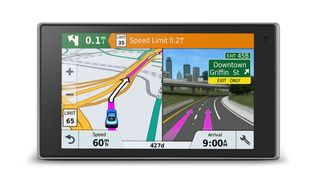
6. Garmin DriveLuxe 51 LMT-D
Specifications
Reasons to buy
Reasons to avoid
The 51 LMT-D from Garmin offers a similar feature set to the 61 LMT-S but with a smaller screen size. This may be a disadvantage to some, but other drivers may well prefer a smaller and less distracting sat nav perched atop their dashboard or stuck to the windscreen.
Features include Bluetooth and Wi-Fi (for connecting your phone and updating the mapping data, respectively). There are also speed camera alerts, traffic information, and 60 minutes of battery life, saving you from having to plug it in on shorter journeys. This sat nav also includes point-of-interest information from TripAdvisor and Foursquare, so you’ll never be short of places to visit no matter where in Europe you are.
Some readers may prefer the design of TomTom’s maps, but if you’re a Garmin person - and you’re looking for a fully-fledged sat nav without a huge display - this could be the one for you.
Motorcycle sat navs
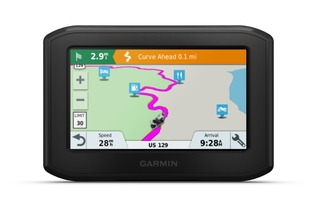
7. Garmin Zumo 396
Specifications
Reasons to buy
Reasons to avoid
If you’re a 2-wheels-good, 4-wheels-bad kind of guy or girl, then the Garmin Zumo 396 has been designed with you in mind.
Armed with a 4.3-inch touchscreen and lifetime world maps, traffic updates and safety camera alerts, it’s also weatherproof to IPX7, resistant to fuel vapors, UV rays and harsh weather.
The Zumo includes a special feature just for riders like you: Adventure Route finds curvy and hilly roads in between you and your destination, and limits your time on boring motorways.
The display is easy to read even in bright sunlight, and also comes with adjustable screen sensitivity – enabling you to carry on using it whether you’re wearing thin or thick gloves.
What else? Well there built-in Wi-Fi for easy map and software updates without a computer, and super helpful rider alerts for upcoming sharp curves, speed cameras, and hazards.
Finally, if you end up upside down in a hedge somewhere, the Zumo will automatically text an emergency contact with your GPS coordinates. It could well save your life.
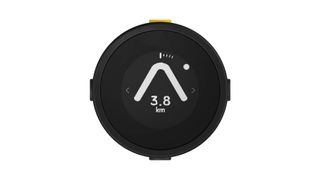
8. Beeline Moto
Specifications
Reasons to buy
Reasons to avoid
The Beeline Moto is a super simple motorbike sat nav. It's not a do-it-all device like the larger motorcycle and in-car sat navs, but that's precisely where its appeal lies, leaving you free to watch the road and not the screen.
The Moto uses Google Maps on your phone for routing and delivers navigation instructions with a simple arrow interface. We feel it delivers enough information to guide you to your destination without bombarding you with loads of additional info that can become a distraction.
If Bluetooth audio and detailed, colour routing, traffic and camera information are essential to you, then this is not the motorbike sat nav for you. But if you want something simple, unobtrusive and affordable to help you get from A to B, then the Beeline Moto is an excellent choice.
Read the full Beeline Moto review
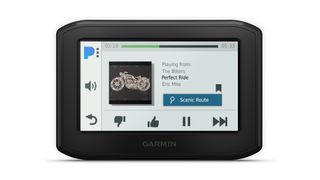
9. Garmin Zumo 346 LMT-S
Specifications
Reasons to buy
Reasons to avoid
While spending hundreds of pounds on a sat nav for your car could be debated, they still make perfect sense for motorbike riders. At this end of the market, options like the Zumo 346 LMT-S by Garmin are bike friendly by including IPX7 waterproofing, a rugged, shock-resistant body, and a touchscreen which works when wearing gloves.
This particular model has a 10.9 cm (4.3 inch) display and maps for Western Europe, although you can spend more to include the whole of Europe, and to increase the screen to 12.7 cm (5 inches).
Where bike sat navs also excel is in their battery life, as there is less likelihood of onboard power being available. As such, this Garmin will last for a claimed four hours - plenty for a Sunday morning jaunt, but you may want to consider packing the charger for longer two-wheeled adventures.
There is also a bike-specific warning system which reminds you when it is national law to wear a helmet, and alerts you to sharp corners ahead. Meanwhile, the mapping data includes bike-specific points of interest, like motorcycle repair shops, dealers, and more.
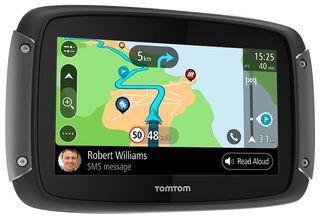
10. TomTom Rider 550
Specifications
Reasons to buy
Reasons to avoid
An updated version of one our favourite bike sat navs from last year, the TomTom Rider 550 is better than ever.
Goodies include a higher resolution 11cm WQVA touchscreen, which is easy to read even in bright sunlight, while adjustable touch sensitivity means it’ll still work whether you’re wearing light or heavy gloves. The TomTom Rider 550 also includes a new quad-core processor for faster, smoother operation and navigation, and you can now also update the device via Wi-Fi.
Naturally, the TomTom GO Rider 550 is weather and drop-proof to IPX7 and includes a bunch of features that will a delight to riders – from Ride Challenge levels, which enables you to choose routes with winding and hilly roads rather than straights; and Road Trips – carefully curated routes for bikers which send you on some of the world’s most spectacular journeys with rest areas and scenic stops marked along the way.
What else? Class-leading route guidance and Bluetooth connectivity so you can pair it with your smartphone? Yep. You can even have your smartphone messages read out loud to you through your headset, and make and take hands-free calls using Google Now and Siri.
Oh, and you also get Lifetime Map and Lifetime Speed Camera updates, plus Lifetime TomTom Traffic warnings, which include known accident black spots and jam tailbacks. Time to get your leathers on...

11. TomTom Vio
Specifications
Reasons to buy
Reasons to avoid
Whether you’re living La Dolce Vita in Rome or Romford, the TomTom Vio is what you need. Designed to fit on the tubular mirror sticks on scooters, it delivers turn-by-turn driving instructions from the dedicated TomTom Via app on your smartphone via Bluetooth — enabling you to concentrate on where you’re getting your next frappuccino from.
Available in seven different colours — green, blue, white, pink, red, yellow and black — to match your scooter and your lifestyle, it comes with a weatherproof 6cm colour circular display that displays your route, safety camera alerts and even tells you about incoming calls. And the touchscreen still works even if you’re wearing gloves - the ultimate satnav style statement.
Other sat navs
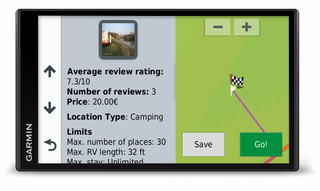
12. Garmin Camper 770 LMT-D
Specifications
Reasons to buy
Reasons to avoid
If you own a camper van or caravan you need this sat nav. Why? Let us count the ways….
For a start it comes with a huge 17.7cm touchscreen display for easy route planning and navigation; and they’re not just any ordinary routes: you can tell the Garmin Camper 770 LMT-D the size of your rig so it can plot your route accordingly; and it includes campsite data so you’ll not only be able to find somewhere to rest up overnight, but you’ll also know what facilities are there before you arrive. Heck, it can even tell you about parking availability and local weather at your destination via Garmin’s Live Services.
The Garmin Camper 770 LMT-D also comes with built-in Wi-Fi for fast updating without the need for cables, and you can hook it up to your smartphone via Bluetooth – you even can use its LiveTrack feature to tell your friends and family exactly where you are.
Even better, Garmin has teamed up with TripAdvisor and FourSquare to offer point of interest, restaurant and attraction reviews. The Camper 770 LMT-D’s Trip Planner tool can even suggest interesting places to stop off at along your route. Let's sit around a campfire and sing a song.
The only thing we don’t like? This sat nav's very short battery life when you’re not plugged into power – it lasts an hour.
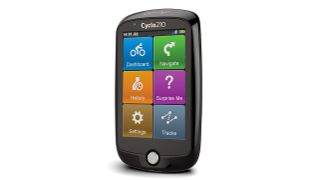
13. Mio Cyclo 210
Specifications
Reasons to buy
Reasons to avoid
Dedicated sat navs also make a lot of sense when strapped to the handlebars of your bicycle - because you certainly wouldn’t want to fall off with a £1,000-plus smartphone in its place. The market is vast, but a good starting point is the Cyclo 210 by Mio.
This is Mio’s entry-level cycling sat nav, but comes with the basics, like mapping for all of Europe, a simple touchscreen interface to poke at while you’re riding, IP5X water resistance so it should survive a splash of water, and a huge battery life of up to 10 hours.
Similar to how the Garmin above helps you find biker-specific amenities, the Mio does the same for cyclists, with its maps full of bike shops, food and drink stops, emergency locations and more. There’s also preinstalled data from OpenstreetMaps to help you navigate cycle paths and avoid the busy main roads.
Finally, a surprise-me feature lets you set a time, distance or duration, then serves up three random cycle routes to pick from.
How to buy a new sat nav
It's best to understand what features you desire from a new sat nav system before embarking on the sometimes exhaustive research process. If it’s something dead simple, merely a nav unit with built-in maps (typically only able to update by plugging it in to a computer), then you can get away with keeping the budget tight.
But if you want your sat nav to offer some of the connected services your smartphone provides, then things get more expensive. On top of this, you often have to connect a smartphone for data, or subscribe to an additional data package via a built-in SIM card.
Manufacturers such as TomTom, Garmin, Beeline and Mio all offer vey different interfaces, as well as the way they display maps and navigational directions. It is worth getting hands on with at least the top three in your list to find out which one you prefer.
We’ve found TomTom maps to be a little easier to navigate in pas tests, but Garmin has done a lot to improve things over recent years, so it’s now a a very close race.
Perhaps most important of all is to make sure your vehicle has an easy way to power the sat nav device, whether that’s through a traditional 12V lighter socket or a more modern USB outlet. Without power, most of these nav systems only last around an hour via the built-in battery, which isn’t enough for an epic road trip.
Sign up to the T3 newsletter for smarter living straight to your inbox
Get all the latest news, reviews, deals and buying guides on gorgeous tech, home and active products from the T3 experts
Alistair is a freelance automotive and technology journalist. He has bylines on esteemed sites such as the BBC, Forbes, TechRadar, and of best of all, T3, where he covers topics ranging from classic cars and men's lifestyle, to smart home technology, phones, electric cars, autonomy, Swiss watches, and much more besides. He is an experienced journalist, writing news, features, interviews and product reviews. If that didn't make him busy enough, he is also the co-host of the AutoChat podcast.
-
 10 essential biceps exercises to sculpt stronger, bigger arms
10 essential biceps exercises to sculpt stronger, bigger armsTop-tier biceps exercises you should use for ultimate muscle gain
By Lucy Miller Published
-
 My favourite Amazon Prime Video show gets a rip-roaring S3 trailer
My favourite Amazon Prime Video show gets a rip-roaring S3 trailerReacher is back, and having bigger fights than ever
By Max Freeman-Mills Published
-
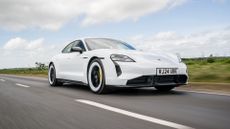 Best EVs 2025: putting this year’s top electric cars to the test
Best EVs 2025: putting this year’s top electric cars to the testFrom Mini to Porsche, these are some of our favourite electric cars available to buy right now
By Alistair Charlton Last updated
-
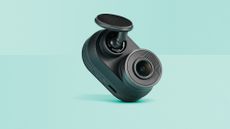 Best front and rear dash cams 2025: Dual channel recorders for your car
Best front and rear dash cams 2025: Dual channel recorders for your carThe best front and rear dash cams will record all angles while you drive, even if something happens behind you
By Alistair Charlton Last updated
-
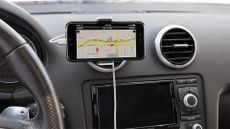 Best car phone holders 2025: mount your smartphone securely in your vehicle
Best car phone holders 2025: mount your smartphone securely in your vehicleThe best car phone holders to mount your smartphone in your car for easy access to GPS and hands-free calling
By Sarah-Jane Butcher Last updated
-
 Best jump starter 2025: bring your car back to life
Best jump starter 2025: bring your car back to lifeT3’s roundup of the best jump starters available to buy right now
By Alistair Charlton Last updated
-
 Best car charger 2023: 12V to USB adaptors
Best car charger 2023: 12V to USB adaptorsThe best car chargers for powering your phone on the go. Whether it's USB, UBS-C, or iPhone chargers
By Alistair Charlton Last updated
-
 Best car cleaning products 2024: from waxes to paint-preserving polish and beyond
Best car cleaning products 2024: from waxes to paint-preserving polish and beyondKeep your car looking shiny and new with the best car cleaning products that cover dirt removal and paintwork protection
By Rob Clymo Last updated
-
 Best car seats 2023: keep your baby or toddler safe
Best car seats 2023: keep your baby or toddler safeThe best car seats are safe, secure and comfortable. We’ve rounded up the best infant seats and booster seats from the likes of Maxi Cosi, Cybex and Joie
By Spencer Hart Last updated
-
 Best car accessories 2025: auto tech you never knew you needed
Best car accessories 2025: auto tech you never knew you neededFrom dash cams to key locators, we’ve put together a list of the best car accessories for your wheels
By Rob Clymo Last updated